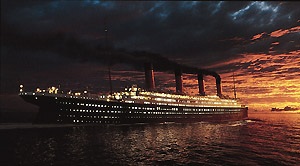
"Titanic" is the greatest film of recent times. That it entertains and touches people on a variety levels is the essence of its success. In "A Brief Study of Titanic", I focused on three of these levels. First, the classic Romantic love story with its brief but lasting intensity. Next, the superb technical achievement allowing the viewer to both marvel at the Titanic's beauty and grandeur as well as experience the shear terror of its tragic sinking. Finally, the film's prominent symbolism regarding the nature and value of Time within human experience; something almost everyone can appreciate via their own cherished memories and longings for the past.
But, there are numerous themes and symbols within the film's framework. In fact, it is through the weaving of this rich allegorical tapestry that James Cameron creates something to be ardently treasured by those who experience this marvelous film. The depth and complexity of this tapestry calls viewers back several times to re-experience and find something new in "Titanic". This essay takes a brief look at some of these "lesser" metaphors and themes.
Cameron does a terrific job of juxtaposing many elements in the picture. Like the past and present in his Time (primary) motif, there is a compelling ebb and flow between intimate human experiences and the ultimate world composed, at once, of precarious nature, meticulous science, and massive machine.
Bodine presents the old Rose with great general detail on how the ship sank. His almost casual recital of the events is accompanied by the animated reconstruction based upon recent scientific findings about the wreckage.
Up to this point, the film was about a methodical treasure hunt, filled with fancy equipment and purely material concern. Rose pauses for a moment and says: "Thank you for that fine forensic analysis, Mr. Bodine. Of course the actual experience of it was somewhat less clinical." Ultimately, what we're talking about here is the sinking of a big ship long ago. Isn't it great that we've figured out so much about it through extensive probes of the wreckage? But, the old Rose turns away to look at the wreck through all the scientific devices. The resonance of deep-sea technology is ever present as she stares at one monitor then another. Sounds of the past ring in her head so softly they can hardly be heard. Emotions come flooding back and she puts her face in her hands. For the first time, we realize this is no mere scientific expedition. This is something heartfelt. Yet, Brock and the others want what she knows. They are after her knowledge about the event, not what happened to her so long ago.
Cameron makes this same point later when, just as Jack and Rose complete their heated lovemaking, he cuts hard to a shot of the Titanic from far above. We go from two bodies breathing in heavy passion to the bigger picture of the ship, its huge well-lit decks inconsequential to the dark sea surrounding it.
After the love scene, Jack and Rose laugh and cavort about the deck in a giddy fashion. Rose pauses to tell Jack that she is getting off the ship with him when it docks. This being the first definitive proclamation of her breaking with Cal and all that he represents inspires a warm embrace followed by a passionate kiss. As the lovers intermingle, however, the ship hits the iceberg. They turn in shock as ice falls about the deck and the berg towers above them. Cameron masterfully clashes a moment of human passion with the horrific beginnings of an abrupt catastrophe that will lead to hundreds of deaths, including one of the lovers themselves.
Following the kiss/collision, Jack and Rose decide to warn Cal and Ruth about the seriousness of the situation. They enter the suite bravely, as one. Rose blandly states that: "Something serious has happened." Thanks to Cameron's work, this line can be taken either of two ways. From the audience's perspective Rose obviously refers to the collision. But Cal takes things differently. "Indeed it has," he says, referring to the serious threat to his relationship with Rose and the accompanying set-up of Jack as thief of the Heart of the Ocean.
Next, Jack is caught, partly by his own doing in stealing another man's coat. That is just icing on the cake, however, for Lovejoy's stealthy guile in slipping the grand necklace into Jack's coat pocket. As the genuine theft and its gravely fabricated counterpart are revealed, Cal rushes into the hallway. A steward happens by, noticing the concern on Cal's face and offers: "Sir, there's no emergency," referring, of course, to the ship's engines stopping. "Oh, yes there is," Cal protests loudly. "Get the Master-at-Arms!" These wonderful double meanings show how intimate and ultimate happenings can be intertwined as well as at odds.
The friction between the intimate and the ultimate increases until we reach the absurdity of Mr. Andrews. As the lifeboats are being prepared, he is fully aware that he and many others are about to die. He walks through a crowd of the upper crust as it chats, listening to music and drinking, trying to keep warm inside. His motions are slow and deliberate, as if he were running at three-quarter speed while the rest of the world simply goes on as before. The festive atmosphere is completely at odds with the reality Andrews knows is transpiring. A waiter approaches him and inquires professionally and politely, "Sir, would you care for a drink?" Andrews just stares at the man and walks on. Later, as Cal and Rose enter the grand staircase, Rose stops Andrews saying: "I saw the iceberg and I see it in your eyes." Here the dichotomy breaks down completely and is unified into a single narcosis.
During one of the cuts back to the present Brock and Bodine continue to analyze the situation as Rose pauses during her tale. Bodine goes on and on about how the Captain has the information about the fields of icebergs ahead, but does nothing except continue at increased speed. Brock comments that the ship's rudder is too small to corner quickly. "Everything he knows is wrong," Brock says of the Captain. We have a clear, concise understanding of the overall situation.
But, Rose is disconnected from their critique. She turns toward a monitor that displays the decaying mantelpiece of her former suite. We morph back to the mantelpiece when it was new, garnished with the trimmings of luxury, a clock ticking methodically as Jack preps the room for the drawing scene. The old Rose's reflective moment remains private, in her memory, as the treasure hunters summarize the historical reconstruction of events.
After the ship sinks, Rose emerges from beneath the water, a frantic, hopeless woman, struggling in the icy water, desperately calling out for Jack. The camera pulls back to reveal that her experience is magnified hundreds of times by an enormous group of people, all splashing about, screaming, slowly freezing to death. In "Titanic", Cameron unveils the depth and vitality of our individual experiences and yet demonstrates how those same experiences are sometimes overwhelmed by larger events.
There are some inspiring moments of this intimate/ultimate dichotomy. Jack and Fabrizio go to the bow of the ship. They experience its great height above the water, the thrill of the speed and wind in their faces. Jack shouts how he feels: "I'm king of the world!" Then the camera pulls back in one of the film's most tremendous shots, revealing the Titanic in all its size and glory, Jack and all the others appearing as ants. From the excitement of an individual's enthralled experience we come to see it as such a tiny thing upon the ship, amidst the ocean.
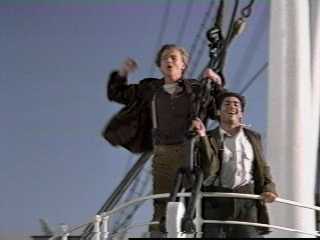
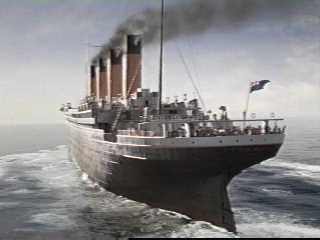
Rose finally ends up alone with Cal, Jack having been taken away handcuffed. Cal, enraged beyond his customary self-control, slaps Rose and lets the words sizzle off his tongue like a snake, "It is a little slut, isn't it?" This, too, is an intimate moment, even if a vicious one. Yet, with a loud knock on the door stewards enter the suite. One notices the look of dismay on Rose's freshly slapped face and comforts her with "Not to worry Miss." It's all just a precaution. There's no emergency. She and Cal must leave immediately and dress warmly. Cal objects but is forced to succumb to the relentless tide of events.


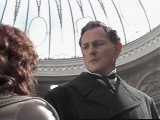

Cal, and his world, is incapable of comprehending such a characteristic due to his cultural upbringing. He orders lamb for her during the lunch scene to be served to his precise specifications. As a polite after-thought, he inquires as to whether or not his "sweetpea" likes lamb. We later hear Ruth make the whispered comment over tea that: "The purpose of a University is to find a suitable husband. Rose already has that." Such comments and events frame Rose's private prison.
It first occurs to Cal that Rose's rebellious nature might need some controlling after her Freud comment to Ismay. Molly jokes that Cal might not be able to handle Rose. "She's a pistol," she says smilingly. To which Cal replies: "Well, I'll just have to mind what she reads from now on." Following her suicide attempt, Cal tries to show Rose his feelings for her the only way he knows how. He puts the Heart of the Ocean around her neck. It is a jewel carved for royalty and, Cal adds tenderly, "We are royalty, Rose." She is almost speechless, staring at the diamond, slowly touching it. Her hand ends up grasping her neck, as if the gem is choking her.
At breakfast following her night of dancing with Jack, Cal is initially well mannered in spite of what is actually happening to him. "I thought, perhaps, you would come to me last night," he suggests. He realizes, perhaps for the first time, that he is losing something he greatly values. In its own way, his heart emerges from beneath the tidy layers of his world. But, that which emerges quickly erupts. He stands, violently throws the breakfast table aside and gets in Rose's face. "You will never behave like that again!" he powerfully commands. For the moment, this puts Rose back in her cage. She even tells Jack in their next stolen moment together that she loves Cal.
In the end, however, it is Rose's spiritual freedom that emerges and thrives. Jack cannot be saved. The physical dies, but the symbols, the inspiration, continue. The last thing we see of Jack is his decent into the cold darkness of the North Atlantic, hands floating lifelessly above him, adorned on each wrist with broken chains.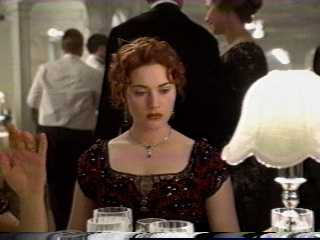 The constraints of life (cultural and physical) are another theme that Cameron explores. Jack is physically handcuffed, restrained, and confined for (allegedly) stealing Rose and the Heart of the Ocean.
Earlier, old Rose recalls: "I saw my whole life as if I'd already lived it... an endless parade of parties and cotillions, yachts and polo matches... always the same narrow people, the same mindless chatter." The picture depicts both characters as imprisoned in their own way. Rose spiritually so and, later, Jack bodily. For Rose, the Ship of Dreams is "a slave ship taking me back to America in chains." Essentially, this is due to a "fire" within her that only Jack appreciates.
The constraints of life (cultural and physical) are another theme that Cameron explores. Jack is physically handcuffed, restrained, and confined for (allegedly) stealing Rose and the Heart of the Ocean.
Earlier, old Rose recalls: "I saw my whole life as if I'd already lived it... an endless parade of parties and cotillions, yachts and polo matches... always the same narrow people, the same mindless chatter." The picture depicts both characters as imprisoned in their own way. Rose spiritually so and, later, Jack bodily. For Rose, the Ship of Dreams is "a slave ship taking me back to America in chains." Essentially, this is due to a "fire" within her that only Jack appreciates.
 Jack breaks Rose's chains, allowing her to "fly", to be freed from what she experiences as complete social confinement. In turn, Rose cuts his chains, physically so, thus saving him (for the moment anyway) from certain death. Her efforts at saving his life are the most heroic act in the picture. How could such a well-bred girl accomplish such a monumental task in the face of danger at every turn without the inspiration Jack gave to her in making her "free"? She fights like hell for him, not only because she loves him, but also because he has saved her from what would have been a certain, pointless existence.
Jack breaks Rose's chains, allowing her to "fly", to be freed from what she experiences as complete social confinement. In turn, Rose cuts his chains, physically so, thus saving him (for the moment anyway) from certain death. Her efforts at saving his life are the most heroic act in the picture. How could such a well-bred girl accomplish such a monumental task in the face of danger at every turn without the inspiration Jack gave to her in making her "free"? She fights like hell for him, not only because she loves him, but also because he has saved her from what would have been a certain, pointless existence.
There are a wealth of metaphors throughout "Titanic" that make statements regarding human trust and commitment. Rose and Jack agree immediately before the ship hits the iceberg that her willingness to get off the boat with him instead of Cal doesn't make any sense. "That's why I trust it," she says. As Rose readies herself to strike a blow at Jack's chains (after clearly demonstrating that she isn't very competent with an ax) Jack says: "You can do it, Rose. Hit it as hard as you can, I trust you." The last thing Jack says to Rose before the stern goes underwater is: "We're gonna make it Rose. Trust me." To which she quickly replies: "I trust you!"
This trust is somewhat challenged later, when Jack is discovered to have stolen another man's coat and, supposedly, the Heart of the Ocean as well. Jack ignores everyone in the room and speaks directly to Rose. "I didn't do it! You know me, Rose!" He repeats this over and over as they carry him away. In the end she realizes that she does in fact KNOW Jack. This knowledge is based solely on her trust of him as a human being.
Trust serves as part of the foundation of their love. As does the natural consequence of trust...commitment. The "You jump, I jump" motif is, of course, there throughout the movie. Such commitment causes Jack to save Rose's life in the suicide scene. His bluffing willingness to jump after her brings her to her senses. "I'm involved now," he says. "I haven't got a choice" if she decides to plunge into the water below.
Such commitment drives Rose through that incredible maze of water and chaos in her attempt to save Jack from drowning while being chained to a pipe in the Master-at-Arms retaining room. She desperately asks Mr. Andrews where people under arrest are taken. Mr. Andrews makes it clear in his instructions that she has to "Take the elevator to the very bottom," obviously the wrong way to go on a sinking ship. Yet she moves quickly. At first out of desperation, then out of shear rage at being unable to free Jack, finding strength for her actions through nothing but a commitment to Jack. More than anything, it is her commitment to Jack that causes her later to jump back onto the Titanic rather than leave him aboard the doomed vessel.
If trust and commitment can build such a solid relationship, actual sacrifice is what propels that relationship out of sheer space and into pure time. Jack ultimately sacrifices his life so that Rose can go on. Film critic Roger Ebert believes that this act of sacrifice is the essence of the film's near universal appeal. "The romance in '"Titanic"' is inconsequential, but the sacrifice at the end is incredibly moving," he writes. This is taking the "I jump, you jump" motif to its supreme manifestation. For the Jack/Rose relationship, Jack's death is the beginning of a spiritual union that will span more than 80 years. In a more peaceful moment, Rose comes to Jack at the bow of "Titanic" after half-heartedly dismissing him from her life. She greets him unexpectedly but Jack interrupts with a "Shhhh", telling her to take his hand. Without apparent reason, he asks her to close her eyes. "Do you trust me?" he asks. "I trust you," she replies. He takes her high up on the bow and asks her to hold out her arms. "All right," Jack says, "open your eyes." Her trust is rewarded with the grand and unexpected experience of "flying" above the sea. It is at this moment that Rose is set "free" from her imprisoned lifeworld.
In a more peaceful moment, Rose comes to Jack at the bow of "Titanic" after half-heartedly dismissing him from her life. She greets him unexpectedly but Jack interrupts with a "Shhhh", telling her to take his hand. Without apparent reason, he asks her to close her eyes. "Do you trust me?" he asks. "I trust you," she replies. He takes her high up on the bow and asks her to hold out her arms. "All right," Jack says, "open your eyes." Her trust is rewarded with the grand and unexpected experience of "flying" above the sea. It is at this moment that Rose is set "free" from her imprisoned lifeworld.